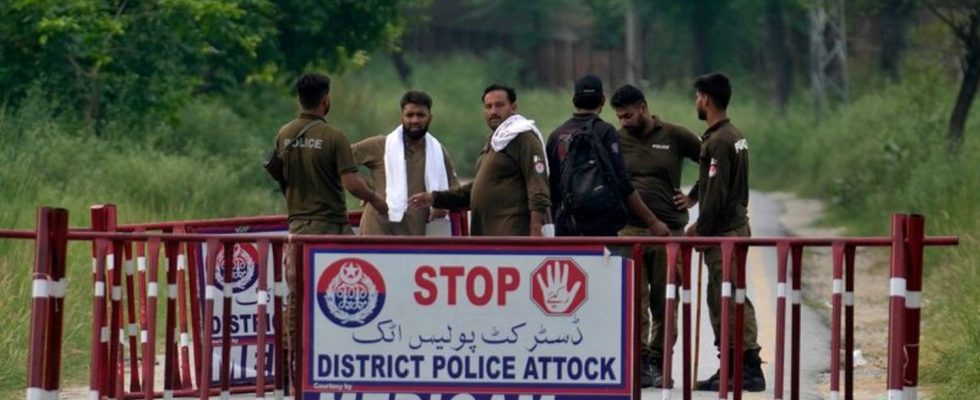ex-prime minister
Pakistan: Khan in maximum security prison after verdict
Police have barricaded a road in Attock leading to the district jail where Pakistan’s ex-Prime Minister Imran Khan is being held. photo
© Anjum Naveed/AP/dpa
A few months before the parliamentary elections, the popular ex-Prime Minister Imran Khan is convicted and sent to a notorious prison. A hard blow to the opposition. Where is nuclear power headed?
The nuclear power Pakistan with its approximately 240 million inhabitants is facing new turbulences: The popular opposition leader is a few months before the parliamentary elections Imran Khan convicted and imprisoned. Security forces took the ex-prime minister from his residence in the east of the country to a high-security prison near the capital Islamabad on Saturday. Khan’s lawyers have been denied access, according to his PTI party.
A court sentenced the 70-year-old to three years in prison in absentia in a corruption trial on Saturday. The former cricket star, who has denied the allegations, can appeal the verdict. Khan is barred from holding political office for the next five years. The popular opposition politician is therefore likely to miss the parliamentary elections.
Khan ousted by no-confidence vote in April 2022
Expert Ahmed Bilal Mehboob from the Pakistani think tank Pildat saw the arrest as a severe blow to Khan’s PTI party. “Khan is the star of the campaign,” Mehboob said. “Time will tell how great the damage will be to Khan’s party,” he said.
In the South Asian country, a power struggle is raging between the actually rival family dynasties that are in government and the ousted ex-prime minister. Khan was overthrown by a vote of no confidence in April 2022 and has since faced numerous charges. Many former top politicians of his PTI party have already turned their backs on him.
In the corruption trial, the opposition leader was accused of concealing proceeds from the sale of state gifts. Among other things, Khan sold a unique diamond-studded wristwatch that he had received as a gift from Saudi Crown Prince Mohammed bin Salman during his tenure (2018-2022).
Khan: “You must continue the peaceful protest”
In a video message, the ex-prime minister said after his arrest: “If this message reaches you, I will be in prison”. He urged his followers not to give up. “If you don’t stand up, you will lead the lives of slaves. You must continue the peaceful protest,” Khan said. A few supporters took to the streets, but there were no major protests.
The ex-prime minister was briefly arrested in May. His followers then stormed military installations. The riots threatened to plunge the country into chaos for a short time. A little later, the army leadership brought demonstrators before military courts in much-criticized trials. Khan then openly criticized the powerful generals in numerous interviews.
Prison cell has no air conditioning
Many observers see the judiciary’s actions against him as politically motivated. Even during Khan’s tenure, the judiciary targeted well-known opposition politicians. Nawaz Sharif, for example, the older brother of incumbent Prime Minister Shehbaz Sharif, was also convicted in a corruption trial. In 2019 he flew to the UK for medical treatment and did not return.
As the Pakistani newspaper “Dawn” reported, Khan is the first prime minister to be housed in the notorious Attock prison in Islamabad. According to the newspaper, the 70-year-old does not receive any special treatment. The cell has no air conditioning, it is equipped with a fan, bed and wash cell.
Pakistan’s Prime Minister Sharif announced on Thursday that parliament would be dissolved early on August 9th. With the political move, the South Asian country now has a month longer to organize the new elections. According to the constitution, this must now take place within 90 days. With a regular end of the legislative period, it would only be 60 days.
Since Pakistan’s founding more than 75 years ago, the South Asian country sandwiched between India and Afghanistan has been rife with unrest and instability. The military ruled for more than half of that time. And even among civilian governments, generals were seen as the force that could decide on the success or failure of political leadership.

